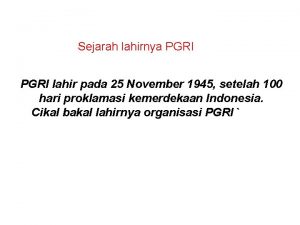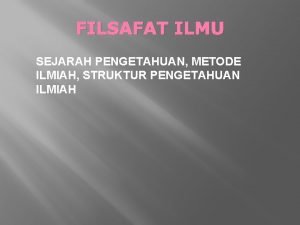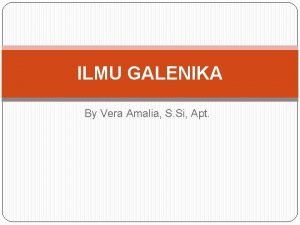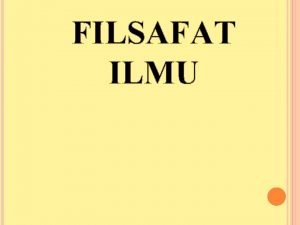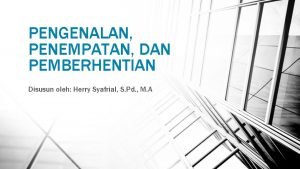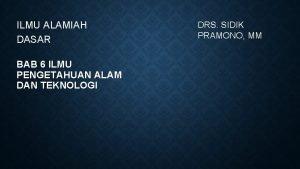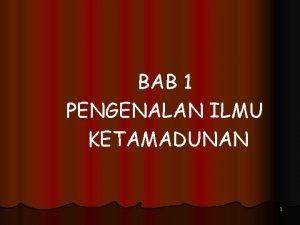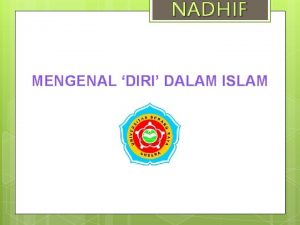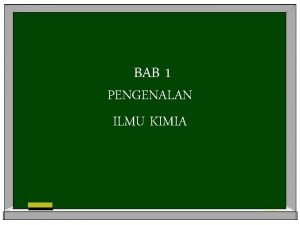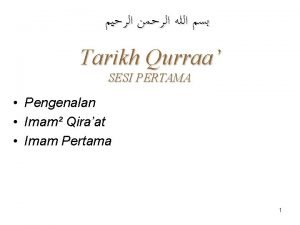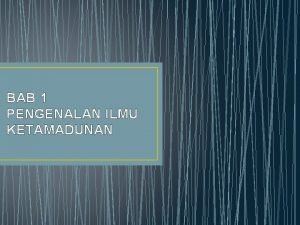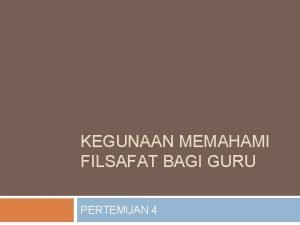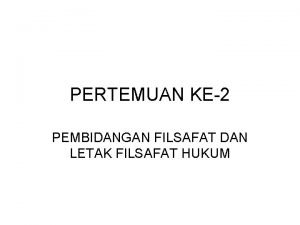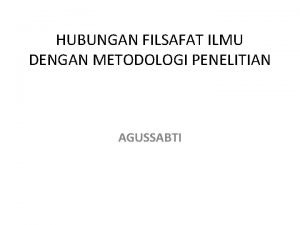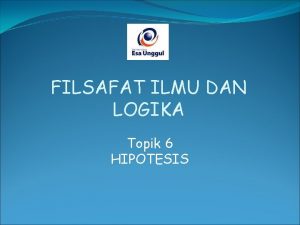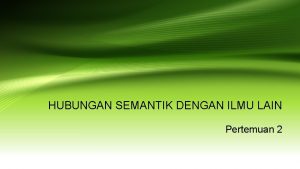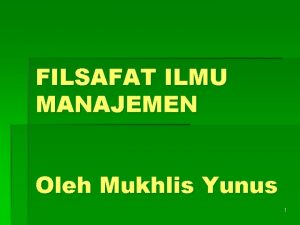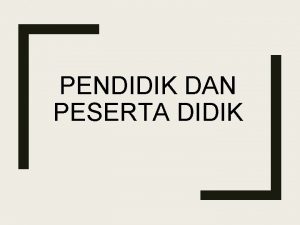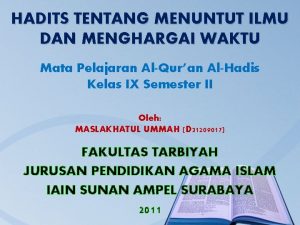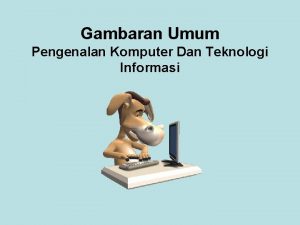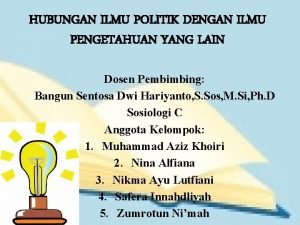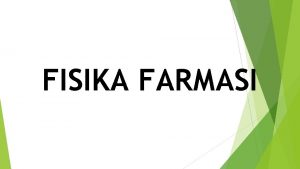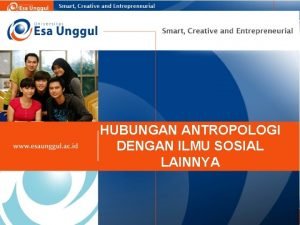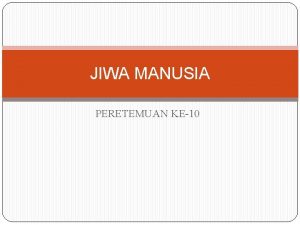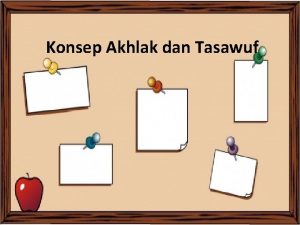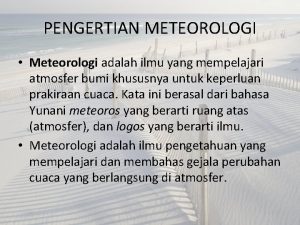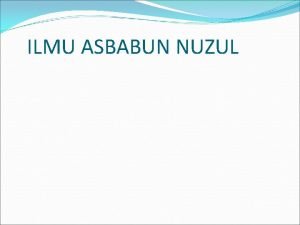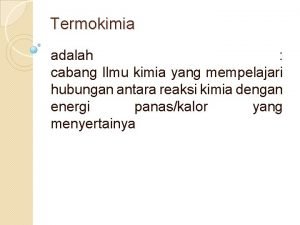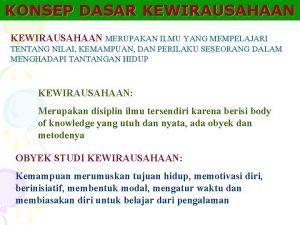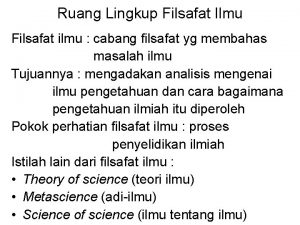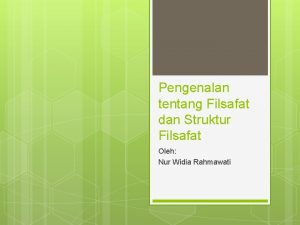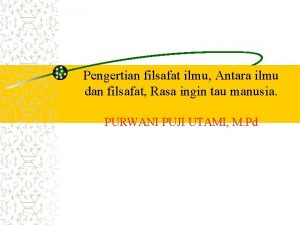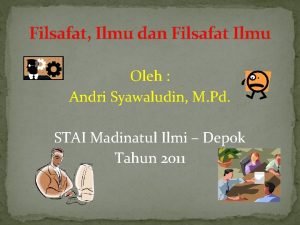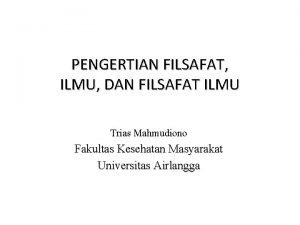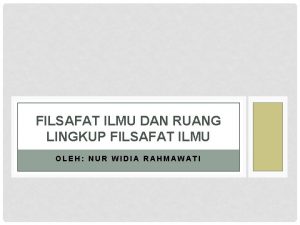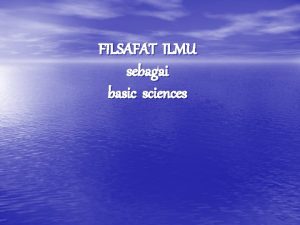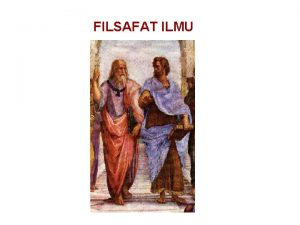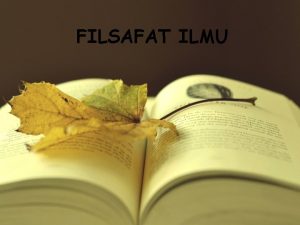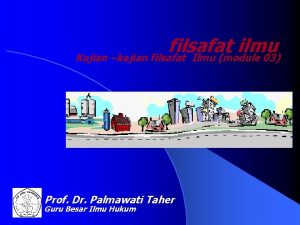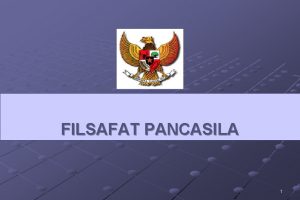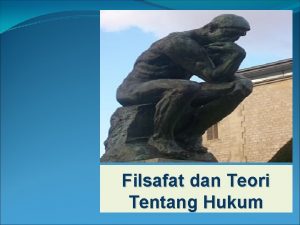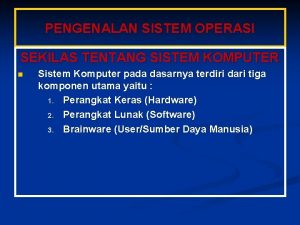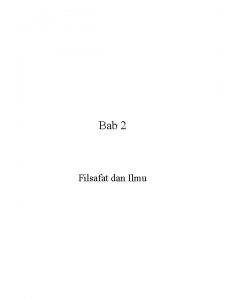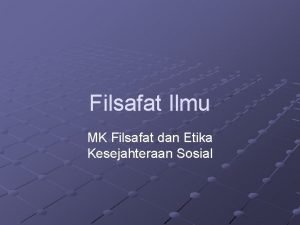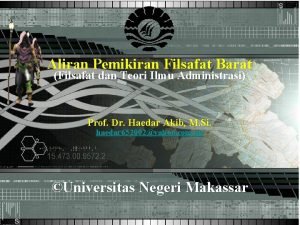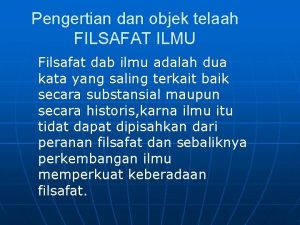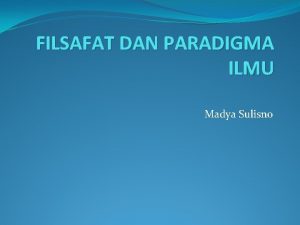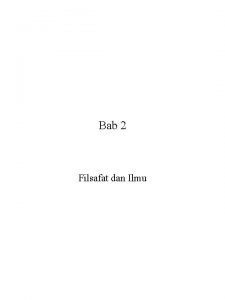Pengenalan Filsafat Ilmu 1 Sekilas tentang Filsafat dan
































- Slides: 32

Pengenalan Filsafat Ilmu 1. Sekilas tentang Filsafat dan Filsafat Ilmu 2. Dasar Ilmu Pengetahuan 3. Tokoh dan sejarah 4. Filsafat Riset Quis I finish

FILSAFAT ILMU Rasa ingin tahu pertanyaan hasil / solusi / jawaban (knowledge) mencari jawaban Metode penelitian Penelitian / Riset Ilmu Pengetahuan back

Filsafat adalah suatu cara berpikir yang radikal dan menyeluruh, dengan cara mengupas pengetahuan sedalam-dalamnya Yuyun (1999); sedangkan ilmu dalam pembelajaran filsapat di katakan kumpulan pengetahuan yang mempunyai ciri-ciri tertentu. Filsafat dapat juga di katakan upaya manusia mengumpulkan pengetahuan sebanyak mungkin dalam proses pengaturan kehidupan secara sistematik.

A priori knowledge or justification is independent of experience, as with mathematics (3+2=5), tautologies ("All bachelors are unmarried"), and deduction frompure reason (e. g. , ontological proofs) A posteriori knowledge or justification is dependent onexperience or empirical evidence, as with most aspects of science andpersonal knowledge

a b g Deductive approach d

Jumlah sudut segi-3 C g g b a A b B

PENALARAN kemampuan manusia untuk melihat dan memberikan tanggapan tentang apa yang dia lihat. Karena manusia adalah makhluk yang mengembangkan pengetahuan dengan cara bersungguh-sungguh, dengan pengetahuan ini dia mampu membedakan mana yang baik dan mana yang buruk. Penalaran juga merupakan kemampuan berfikir cepat, tepat dan mantap. Selain itu penalaran merupakan proses berfikir dan menarik kesimpulan berupa pengetahuan. Penalaran manusia bisa terjadi karena dua hal yaitu manusia mempunyai bahasa dan manusia mampu mengembangkan pengetahuan

Penalaran biasanya di awali dengan berfikir kerena berpikir merupakan suatu kegiatan untuk menemukan pengetahuan yang benar. Ciri-ciri Penalaran Adanya suatu pola pikir yang secara luas dapat disebut logika merupakan suatu kegiatan berfikir yang menyandarkan diri kepada suatu analisis dan menggunakan kerangka berpikir berdasarka logika penalaran yang bersangkutan. dapat dibedakan secara garis besar ciri-ciri berpikir menurut penalaran dan berpikir yang bukan berdasarkan penalaran (tidak lkogis). Perasaan merupakan penarikan kesimpulan yang tidak berdasarkan penalaran

Prinsip-prinsip penalaran 1 Prinsip identitas (principium indentitas) ’’sesuatu hal adalah sama dengan halnya sendiri’’. Dengan kata lain, “sesuatu yang disebut p maka sama dengan p yang dinyatakan itu sendiri bukan yang lain”. 2 Prinsip kontradiksi (principium contradictionis) “sesuatu tidak dapat sekaligus merupakan hal itu dan bukan hal itu pada waktu yang bersamaan”, “sesuatu tidaklah mungkin secara bersamaan merupakan p dan non p”. 3 Prinsip eksklusi (principium exclusi tertii) “sesuatu jika dinyatakan sebagai hal tertentu atau bukan hal tertentu maka tidak ada kemungkinan ketiga yang merupakan jalan tengah. Dengan kata lain, “sesuatu x mestilah p atau non p tidak ada kemungkinan ketiga”

Rasionalisme dan empirisme Pengetahuan yang dipergunakan dalam penalaran pada dasarnya bersumber pada rasio atau fakta. Mereka yang berpendapat bahwa rasio adalah sumber kebenaran mengembangkan paham yang kemudian disebut sebagai rasionalisme. Sedangkan mereka yang menyatakan bahwa fakta yang tertangkap lewat pengalaman manusia merupakan sumber kebenaran mengembangkan paham empirisme

logika diturunkan dari kata “logike” (bahasa yunani) secara etimologi, logika adalah ilmu yang mempelajari pikiran melalui bahasa. Logika juga bisa dikatakan penarikan kesimpulan dari apa yang dianggap benar dari suatu proses penalaran. logika adalah asas-asas yang menentukan pemikiran yang lurus, tepat, dan sehat. Agar dapat berpikir lurus, tepat, dan teratur, logika menyelidiki, merumuskan serta menerapkan hukum-hukum yang harus ditepati. Logika itu adalah cara berpikir manusia yang disusun berdasarkan pola tertentu

DEDUKSI dan INDUKSI Deduksi adalah cara berpikir dimana dari pernyataan yang bersifat umum ditarik kesimpulan yang bersifat khusus, selain itu metode deduksi ialah cara penanganan terhadap sesuatu objek tertentu dengan jalan menarik kesimpulan mengenai hal-hal yang bersifat umum. Logika deduktif adalah suatu ragam logika yang mempelajari asas-asas penalaran yang bersifat deduktif Penarikan kesimpulan secara deduktif biasanya mempergunakan pola pikir yang dinamakan silogismus Pernyataan yang mendukung silogismus ini disebut premis yang kemudian dapat dibedakan sebagai permis mayor dan permis minor Kesimpulan merupakan pengetahuan yang didapat dari penalaran deduktif berdasarkan kedua permis tersebut : premis mayor, premis minor dan penrikan kesimpuloannya semua harus benar

INDUKSI Induksi merupakan cara berpikir di mana ditarik kesimpulan umum dari berbagai kasus yang bersifat individual, selain itu metode induksi ialah cara penanganan terhadap suatu objek tertentu dengn jalan menarik kesimpulan yang bersifat umum atau bersifat lebih umum berdasarkan atas pemahaman atau pengamatan terhadap sejumlah hal yang bersifat khusus Secara induktif maka dari berbagai pernyataan yang bersifat umum dapat disimpulkan pernyataan yang bersifat lebih umum lagi Melihat dari contoh bahwa semua binatang mempunyai mata dan semua manusia mata, dapat ditarik kesimpulan bahwa semua makhluk mempunyai mata

Terima kasih

Philosophy of Science Agenda • Aspects of Epistemology and Ontology – Data, Information, Knowledge, Wisdom • Theory, Scientific Theory, Paradigms • Systems and Models • The Nature and Process of Science • Alternative Research Approaches and Traditions • Research Concepts and Terminology

Ontology • The study of what exists • The opposing views are: – 'Materialism', which holds that anything that exists can be detected through the senses – 'Idealism', which says that everything exists in the mind, and that the 'real world' that we think we see is only a shared idea • The conventional compromise is to recognise : – external realities (the secular or Real World) – internal ‘mind-stuff’ (the Abstract World)

Epistemology • The study of knowledge, its sources, varieties, limits • Competing Views: – 'Empiricism' holds that knowledge is derived from experience. The extreme form is referred to as 'positivism' or 'logical positivism', and holds that nothing is innate, and that only that which can be measured is worth worrying about – 'Apriorism' considers that knowledge is innate. The extreme form denies the very idea of knowledge existing outside the individual mind

Definitions of Research • An attemp to answer questions by means of gathering and interpreting of information (Hyllegard, Mood, and Morrow, 1996). • Research is a systematic attempt to provide answers to questions (Tuckman, 1999). • Research may be defined as the systematic and objective analysis and recording of controlled observations that may lead to the development of generalizations, principles, or theories, resulting in prediction and possible control of events (Best and Kahn, 1998). • Research is a systematic way of asking questions, a systematic method of inquiry (Drew, Hardman, and Hart, 1996).

Development of Research Skills • Learning how to conduct good research: – New skills (that many people do not have) – Better understanding and interpretation of the literature – Recognize new questions that need investigation • Objectivity is the key element of research

Search for Truth Five sources of evidence in the pursuit of truth: 1. 2. 3. 4. 5. Custom and tradition Authority Personal experience Deductive reasoning Scientific inquiry

Deductive Reasoning • A. k. a. , Logic. – In deductive reasoning, thinking proceeds from general assumption to specific application – GENERAL SPECIFIC – Aristotle and other early philosophers • Drawing conclusions through categorical syllogism. • All philosophers are moral. Socrates is a philosopher. Therefore, Socrates is moral. • Resistance training makes one big and bulky by increasing body mass. Sandi is resistance training. Therefore, Sandi will become big and bulky. – Not sufficient as a source of new truth

Inductive Reasoning Conclusions about events (general) are based on information generated through many individual and direct observations (specific). – SPECIFIC GENERAL – Researchers observe an individual or group of individuals from a larger population based on these observations, generalizations are made back to the larger population.

Deductive vs. Inductive Reasoning • Deductive: – Every mammal has lungs. All rabbits are mammals. Therefore, every rabbit has lungs. • Inductive: – Every rabbit that has been observed has lungs. Therefore, every rabbit has lungs.

The Scientific Method • Systematic; cyclic; series of logical steps. – Identifying the problem – Formulating a hypothesis – Developing the research plan – Collecting and analyzing the data – Interpreting results and forming conclusions

Identifying the Problem • First, and arguably the most important, step – Several sources • Theoretical basis • Professional practice • Personal experience • Shear curiosity – Starts as a broad question that must be narrowed – Problem statement; experimental approach to the problem; etc.

Identifying the Problem • Three categories when selecting a research problem – Those who know precisely what they want to do and have a well conceived problem – Those who have many interest areas and are having difficulty deciding exactly what they want to study – Those who do not have any idea about a worthwhile research problem

Formulating a Hypothesis • Hypothesis: – A belief or prediction of the eventual outcome of the research – A concrete, specific statement about the relationships between phenomena – Based on deductive reasoning – 2 types of hypotheses: • Null hypothesis (HO) – All is equal; no differences exist • Alternative (research) hypothesis (HA) – Usually specific and opposite to the null

Developing the Research Plan A strategy must be developed for gathering and analyzing the information that is required to test the hypotheses or answer the research question – Four parts: • Selection of a relevant research methodology • Identification of subjects or participants • Description of the data-gathering procedures • Specification of the data analysis techniques – Pilot studies, IRB, …all must be determined in advance!

Collecting and Analyzing the Data • Following all the pre-determined protocols – Time in the lab collecting data – Analyzing the composite data – Controlling the environment • Easiest part of the process… – However, sometime the most time-consuming part of the process…

Interpreting Results and Forming Conclusions • DATA ANALYSIS IS NOT AN END IN ITSELF! • Does the evidence support or refute the original hypotheses? – Accept or reject the hypotheses – Conclusions should be drawn: • Develop new hypotheses to explain the results • Inferences are typically made beyond the specific study

New Questions Arise Question Identified Results Interpreted Hypotheses Formed Data Collected Research Plan Closed-loop conceptualization of the research process (Drew, Hardman, and Hart, 1996)

 Lahirnya pgri
Lahirnya pgri Struktur pengetahuan
Struktur pengetahuan Sediaan galenika
Sediaan galenika Penelitian dan penulisan ilmiah dalam filsafat ilmu
Penelitian dan penulisan ilmiah dalam filsafat ilmu Inductive presentation
Inductive presentation Pertanyaan tentang pengenalan penempatan dan pemberhentian
Pertanyaan tentang pengenalan penempatan dan pemberhentian Perbedaan ilmu alamiah dasar dan ilmu pengetahuan alam
Perbedaan ilmu alamiah dasar dan ilmu pengetahuan alam Aidanjannah bab 1
Aidanjannah bab 1 Mengenal diri dalam islam
Mengenal diri dalam islam Bab 1 pengenalan ilmu kimia
Bab 1 pengenalan ilmu kimia Imam mahdi ciri ciri
Imam mahdi ciri ciri Faktor yang mempercepatkan kejatuhan tamadun indus
Faktor yang mempercepatkan kejatuhan tamadun indus Ilmu filsafat adalah
Ilmu filsafat adalah Letak filsafat hukum
Letak filsafat hukum Hubungan filsafat ilmu dengan metodologi penelitian
Hubungan filsafat ilmu dengan metodologi penelitian Logika hipotesis adalah
Logika hipotesis adalah Cabang-cabang ilmu filsafat
Cabang-cabang ilmu filsafat Hubungan semantik dengan antropologi
Hubungan semantik dengan antropologi Mukhlis yunus
Mukhlis yunus Pertanyaan tentang karakteristik peserta didik
Pertanyaan tentang karakteristik peserta didik Ayat al-qur'an tentang menghargai waktu dan menuntut ilmu
Ayat al-qur'an tentang menghargai waktu dan menuntut ilmu Pengenalan tentang gambaran umum
Pengenalan tentang gambaran umum Hubungan ilmu politik dengan ilmu lainnya
Hubungan ilmu politik dengan ilmu lainnya Hubungan ilmu farmasi dengan ilmu fisika
Hubungan ilmu farmasi dengan ilmu fisika Hubungan antropologi dengan ilmu lainnya
Hubungan antropologi dengan ilmu lainnya Sukma
Sukma Hubungan ilmu akhlak dengan ilmu tasawuf
Hubungan ilmu akhlak dengan ilmu tasawuf Filsafat siapakah aku
Filsafat siapakah aku Etika merupakan cabang filsafat yang berbicara tentang
Etika merupakan cabang filsafat yang berbicara tentang Meteorologi adalah
Meteorologi adalah Contoh soal asbabun nuzul dan jawabannya
Contoh soal asbabun nuzul dan jawabannya Termokimia adalah ilmu kimia yang mempelajari tentang
Termokimia adalah ilmu kimia yang mempelajari tentang Kewirausahaan adalah ilmu yang mempelajari tentang
Kewirausahaan adalah ilmu yang mempelajari tentang
